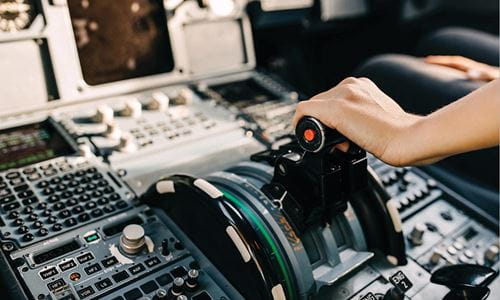
Air Line Pilot Magazine March 2023
 Safety Is Always at the Forefront
Safety Is Always at the Forefront
Safety is at the forefront of everything ALPA pilots do—on the flight deck and in our policy agenda for global air transportation. At the same time, our union is equally committed to urging airline managements to invest in their pilot workforce, end foot-dragging in contract negotiations, and reach the fair agreements that pilots have earned.
ALPA fully supports the FAA’s recent safety call to action, as well as the NTSB’s investigations of incidents in flight operations. The investigations are taking place under a mutual understanding that ALPA successfully reached to make certain investigators receive the information they need and that pilots’ privacy is ensured. We’re fully behind these and all nonpunitive efforts to collect and analyze aviation safety data.
As Congress begins discussing the next FAA reauthorization, I made clear in testimony before the U.S. House Committee on Transportation and Infrastructure that ALPA pilots won’t accept anything less than one level of safety across U.S. air transportation, nor will we allow any weakening or rollback of first officer qualification, experience, and training requirements (see page 50). We reinforced this message during a remembrance ceremony in advance of the 14th anniversary of the Colgan Air Flight 3407 accident, which was the final in a series of tragedies that led to the current safety-centered requirements (see page 18).
n the upcoming reauthorization, our union is also urging lawmakers to provide the FAA with the sustained funding across appropriations cycles it needs to modernize critical systems such as Notice to Air Missions (see page29). Our pilots’ message to lawmakers includes calling for action on primary and secondary flight deck barriers on cargo and passenger aircraft, aircraft rescue and firefighting for all-cargo operations, and voluntary safety data and flight deck recording protections.
At this important time on Capitol Hill, I’m pleased that our union has already welcomed more than 200 new donors to ALPA-PAC this year. Through ALPA-PAC, and thanks to our Roll of Distinction contributors, ALPA pilots demonstrate to policy makers our solidarity as the respected voice of the industry (see page 32).
Meanwhile, our pilots’ unity has also resulted in contracts with improvements in pay, health care, and retirement at Delta, Hawaiian, JetBlue, Spirit. At the same time, our union is directing resources to pilot groups that are currently in negotiations, including those in Canada that have yet to see similar contract gains despite their airlines’ profitability. We’re also debunking false claims about lower profits from management at some cargo airlines and calling for fair contracts with improved quality of life, scheduling, and job security that will not only give current pilots the pay and benefits they’ve earned, but will also help the airlines retain and attract pilots.
More broadly, ALPA is fighting efforts by some airlines in the United States and Canada to use pilot supply as an excuse to drive down wages, dismiss issues with scheduling and working conditions, and misuse employment visas and the Temporary Foreign Worker Program, which airlines such as Sunwing are exploiting to hire foreign pilots despite the availability of qualified Canadian pilots (see page 22).
ALPA’s recent Leadership Training Conference is just one way we’re equipping ALPA leaders with the knowledge and tools for success in taking on challenges like these (see page 26). We need every available resource to combat the threats to our profession, within and beyond our national borders. For this reason, we’re working to bring other North American pilot unions into our ranks—including engaging in merger talks with the Air Canada Pilots Association.
To the same point, we’re also strengthening our relationships with pilot unions around the globe, including the International Federation of Air Line Pilots’ Associations and the European Cockpit Association and taking an international approach to issues such as combating efforts to reduce the number of pilots on the flight deck. The safe outcome after an engine fire on Amerijet Flight 99 (see page 20) demonstrates how ALPA’s strong, global pilot relationships benefit our members. In addition, this flight, as well as FedEx Express Flight 1432, are examples of why having at least two experienced, trained, and rested pilots on every airliner flight deck at all times is essential to safety, regardless of whether the airplane is carrying passengers, cargo, or both.
Now and always, ALPA pilots are moving forward together and keeping safety at the forefront.
In This Issue:
Embracing Change While Building Unity
ALPA Honors Colgan Air Flight 3407 Victims
ALPA Beyond Borders: Working with International Partners
Inside a Big Win for Canadian Pilots
Fatigue: a Persistent Problem for Pilots
Building Skills for Effective Leadership
ALPA Urges Upgrade to NOTAM System Following Recent Disruption of Flights
Abandoned Airport Puppy Goes Viral, Gets Adopted by Caring United Pilot Family
ALPA President Urges Congress to Prioritize Aviation Safety
IFALPA Affiliation Makes ALPA Stronger
Steps You Can Take to Reduce the Effects of Jet Lag
Spirit Pilot 'Grapples' with New Role as MMA Reality TV Show Producer












